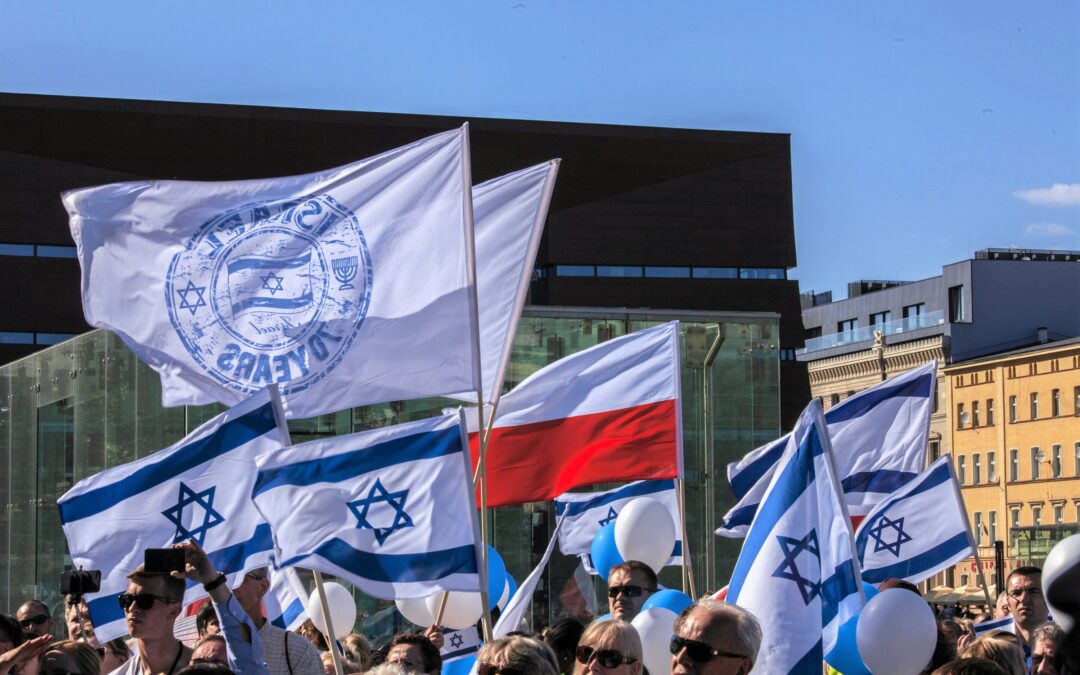It is impossible to imagine modern Israel and Judaism without their Polish roots, says Israel’s ambassador to Poland. He called for Poles and Jews to remember that, as well as the “dark chapter” of the Holocaust, they have centuries of shared history.
Yacov Livne – who took up his post last year after a period in which Poland and Israel withdrew their ambassadors amid a diplomatic dispute – was speaking yesterday in Toruń at a college founded by Father Tadeusz Rydzyk, an influential Catholic priest with close links to Poland’s national-conservative government.
Rydzyk has in the past been accused of promoting antisemitism through Radio Maryja, the broadcaster he founded in the 1990s. However, in recent years he has repositioned himself as a promoter of Polish-Jewish dialogue.
Mój wykład na temat obecnych relacji #Izrael – #Polska. Dziękuję @AKSiMTorun i przyjaciołom w Toruniu za ten ważny dialog!
Some remarks I made on the current state of #Israeli – #Polish relations. Thank you AKSiM and friends for organizing this important dialogue. https://t.co/fmZZb9cpmO pic.twitter.com/fz6MwRBoLU
— Amb. Yacov Livne 🇮🇱 (@YacovLivne) January 20, 2023
Speaking to an audience that included Polish education minister Przemysław Czarnek, Livne thanked Rydzyk for the invitation. “Dialogue and knowledge are the most fundamental base for understanding,” said the ambassador.
He noted that, with the state of Israel preparing to celebrate the 75th anniversary of its declaration of independence, it is worth recalling that many of its founders came from Polish lands.
They included the man who proclaimed that declaration of independence, Israel’s first prime minister, David Ben-Gurion, who was born in the Polish city of Płońsk.
Menachem Begin, a then leading opposition figure and later prime minister, hailed from Brest, a city historically part of Poland but that since 1944 lies in Belarus.
“The Jewish people and the Polish people have an incredible common history and heritage” stretching back over 1,000 years, declared Livne stretching
“I think we created together [something] really incredible…[and this helps us to] understand what Judaism is and also what Poland is,” the ambassador continued. “We cannot possibly imagine modern Israel or modern Judaism without our Polish roots. It is simply impossible.”
Livne noted that for centuries Polish lands housed the majority of the world’s Jewish population. By the mid-16th century – after Jews had fled persecution in western and southern Europe for the tolerance offered in Poland – around 80% of the world’s Jews lived there, according to the Jewish Virtual Library.
“Warsaw was in a way the capital of the Jewish people,” said the ambassador.
Livne also noted that, through much of that history, Poles and Jews enjoyed close relations. “In so many cases, Jews and Poles were fighting – not against each other, we were fighting together.”
He pointed to the examples of Berek Joselewicz – a Jewish officer in the Polish army during the 1794 uprising against Russian and Prussian rule – and the Second World War, “when Jews and Poles were fighting on the right side of history against the total evil of Nazism”.
Livne recalled that, while the Nazis first aimed to wipe out the Jews, they also planned to enslave and murder the Poles – “and many [Poles] were indeed murdered”. The ambassador also recalled that many “brave Poles risked their own lives in order to save Jews” from the Holocaust.
He did describe the Holocaust as the “darkest chapter” in Polish-Jewish history, though added nothing more on the topic. Many in Israel – including government ministers – have accused Poland of trying to downplay the history of Poles who betrayed, robbed or murdered Jews during the war.
Finally, Livne recalled the positive role that Pope John Paul II, a Pole, played in “writing a completely new and positive chapter in relations between Jews and Christians, Jews and Catholics, Jews and Poles”. He recalled how in 1986 John Paul II become the first pope in history to visit a synagogue.
Speaking after the ambassador, Czarnek, the education minister, thanked Livne for seeking to create a path to constructive dialogue between the two countries, which have in recent years been locked in a series of diplomatic disputes.
The latest concerns Holocaust education trips to Poland by Israeli youths, which were last year suspended by the Polish government. Czarnek claimed at the time that Holocaust history is often “distorted” in Israel, with Poles blamed for crimes rather than Germany.
During his remarks in Toruń, Livne noted that “it is important for Israeli youth to come to Poland to learn about what we have in common”.
Czarnek agreed that there is “a great need to remind the young generations, both Israeli and Polish, about the common, centuries-old, very good Polish-Jewish tradition and culture here in Polish lands”.
The Polish government has summoned Israel's ambassador to explain remarks in which he said that Poland is blocking Israeli Holocaust education trips.
The trips were suspended this year, with Poland saying they "strengthen false stereotypes" about Poles https://t.co/kVdsIWMkvI
— Notes from Poland 🇵🇱 (@notesfrompoland) October 17, 2022
Main image credit: Krzysztof Cwik / Agencja Gazeta

Daniel Tilles is editor-in-chief of Notes from Poland. He has written on Polish affairs for a wide range of publications, including Foreign Policy, POLITICO Europe, EUobserver and Dziennik Gazeta Prawna.




















